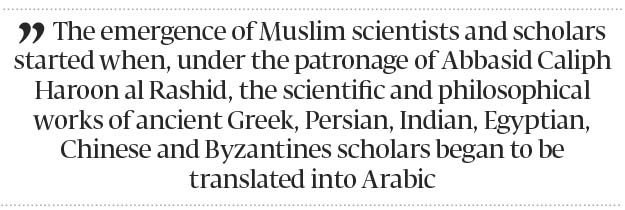
The glorification of Muslim scientists and their contributions has little practical impact on present-day Muslims without pondering on the causes that led to the rise of those scientists to the forefront of knowledge.
There was no prominent Muslim contribution to science, philosophy and art in the first century and a half of Islam. The emergence of Muslim scientists and scholars started during the Abbasid reign when, under the patronage of Abbasid Caliph Haroon al Rashid, the scientific and philosophical works of ancient Greek, Persian, Indian, Egyptian, Chinese and Byzantines scholars began to be translated into Arabic. This support not only continued but also expanded after him when his successor, Mamoon Al-Rashid, established Bayet al Hikma in Baghdad to collect and translate knowledge available from around the world into Arabic. This patronage and support motivated Muslims towards science, philosophy and knowledge seeking, and provided the resources and opportunities for Muslim scholars.

However, they were not the original creators of knowledge as present-day Muslims commonly perceive. They created knowledge through the advancement and expansion of the earlier work of non-Arab, non-Muslim scholars and brought it to the next level. This is not the underestimation of their contributions but rather acknowledgement of their excellence in knowledge building. It parallels with what the West started after the Renaissance and that is picking up the earlier work of Muslim scholars and advancing and expanding it to the next level. A good example is the Arabic numerals, which are symbols used to represent numbers and the present-day numbering system is adapted from them. While the development of Arabic numerals is attributed to al Khwarizmi, a scholar at Bayet al Hikma, he adapted the concept from Hindu mathematicians who invented the numbering scheme for nine numbers and a zero. Later on, the concept of algorithm developed by al Khwarizmi was adapted by Western mathematicians who advanced it to lay the foundation of modern-day computer science.
It is also important to note that it was not just the royal patronage of Abbasids that promoted the study of science among Muslims. The social setup of that era provided the breeding ground for knowledge seekers. There was respect for scholars whether they belonged to Jews, Christians, Zoroastrians or other religious groups. Furthermore, the strong presence of Mu’tazilites promoted rationality, logic and inquisitive thinking in Muslims, which provided the right ingredients to produce high-calibre scientists, mathematicians and philosophers. A similar social setup in Spain produced scientists and philosophers like Ibn Rushd, al-Zahrawi and Ibn Zuhr.
While we all feel proud of the outstanding achievements of Muslim scientists, it is critical to acknowledge that their scientific and intellectual breakthroughs were not led by religious teachings. It was the freedom of thinking, promotion of knowledge, social tolerance and accessibility to resources that fostered the intellectualism, inquisitiveness and creativity in the Muslim society. Major cities like Baghdad, Cordoba and Granada were iconic symbols of science, arts and music in that era. On the other hand, religious intolerance and extremism, rigidity in thoughts and blind following crushes the thinking process and hence, creativity and intellectuality.
A pride in the past achievements is not going to brighten the present and the future of Muslims. Rather than sitting idle on the golden memories of the past, Muslim societies should develop the environment that nurture such achievements by adapting free thinking, promoting inquisitiveness and encouraging knowledge seeking in science, philosophy and arts. They have successful examples of past Muslim contributions and present Western advancements both of which have adapted a similar approach of acquiring knowledge from all sources, and nurturing and supporting brilliant minds in society to move knowledge to the next level. The progressive societies will continue to advance. If Muslim societies do not move along at the same pace, they will be left behind. The more they delay, the more they will struggle to catch up.
Published in The Express Tribune, May 12th, 2017.
Like Opinion & Editorial on Facebook, follow @ETOpEd on Twitter to receive all updates on all our daily pieces.




1730464033-0/BeFunky-collage-(12)1730464033-0-165x106.webp)







COMMENTS (2)
Comments are moderated and generally will be posted if they are on-topic and not abusive.
For more information, please see our Comments FAQ